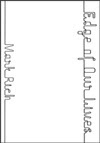For some days my shirt pocket has been holding, near my heart, a dream of un-dreamlike immediacy and almost palpable reality.
In it, the incompetence and brash blunderings, verbal and otherwise, of a certain world leader make a saint of him. Through his actions and inactions he forces his country into a corner where the practices and processes falter that have primarily a monetary reason for being. Of the space it occupied before, no more than this corner remains to his country. Only through dedication to individual well-being on a universal basis may it again enjoy freedom of the whole room. Capitalism staggers, if not quite collapses. A socialist remedy offers the sole recourse. The solution to the country's ills requires cooperation, mutual regard, and thoughtfulness.
Meanwhile the roads are emptying. We hear "the busy hum of men" — that hum which drew Milton's youthful thoughts toward the city and away from rustic ways and pleasures — die down to something un-busy, if a hum at all. We find ourselves swept up, too, in helping meet the Paris Accord. Up till now, emissions-reduction guidelines have generated much hot air and heated reaction, contrary to their aim. Cooler exhalations emerge. Not only have we shown ourselves that human health towers over the putatively all-powerful deity of The Economy, but we find that the quieting of the busy hum puts us in the corner of what we call Nature, or the Earth.
Our corner seems not so small, suddenly; and that old room, the one from which our country is in retreat, less large.
Absurd, you say? Dreams are. And which would we rather have? A lamed Hephaestus named The Economy, or a Nature in the process of being murdered? Do we not hope to hear that shout across the waves from a far island: "Oh — I was wrong! Pan is not quite dead!"
Besides the staggering Economy and a more freely breathing Nature, those among us who regularly attend the church of Poetry are learning that a revered spirit, that of Silence, has not forsaken the human world. With what pleasure, the other morning, I stepped out to check our bird feeders and heard chickadees, finches, and, in the distance, crows — but not a motor, even though a state highway cuts through our village not a block away, and another, larger one transects it but a mile from here.
Single-handedly for his country, through ill-meaning impatience and self-interested blindness, this world leader has subdued the malignant deity that propped him up, has abruptly lowered fossil-fuel emissions, and here and there, now and then, has restored the Sabbath stillness that has gone missing from even the Sabbath. Seeing this man-child of tantrums wearing this new halo of wholesome achievement, we may feel the urge to raise him to sainthood — even though he has proven himself not quite the material for presidency.
How strange it has seemed to me that this last should still have needed proving. But much has seemed strange, and worse than strange, even before this time of calamity and fatality.
Weekday mornings, in our village, we listen in vain for Silence. The local bank has been building a new, large facility near here, which as yet is but a steel skeleton with walls and a few window-openings. The construction crew still appears early for work, running potent equipment and driving outsized vehicles over what peace and quiet might lie in their path — as such vehicles do, without asking permission from nearby ears.
In my mind, dare I say, I see shambling members of a dying race toiling in the lifeless shell of a temple to money earned from money.
We never will leave our noise behind us, though — except by going extinct. We never will leave it because it is a part of us — a part that has been stolen, disfigured, and amplified by motors and automatic tools, and rendered so malignantly overpowering that it dominates some arts. Reading Keats, though, teaches us that "gently whisp'ring noise" may mark a realm where gathered souls may find fulfillment. "Noise" appears in his sonnet "To My Brothers" not as an awkward rhyme that Keats forced into place, but as a fitting word. "Noise," in his time, applied to a spectrum of sounds.
May we find it in us to re-create a vanished world, and to restore that driven-away, whispering end to the spectrum — now that restoring it has been shown humanly possible.
Elsewhere . . . the life of the sea returns to Venice, and blue to the sky of China. Perhaps in those places as here, the life of the soul threatens a return, to meliorate an increasingly uncivil civilization. Silence opens the door for such a return.
I personally would rather not see a blathering blusterer ascend to sainthood — so well-suited does he seem to descent. I have in mind, however, Emerson's conception of a force that he called Fate, that goes masked in many guises.
"If Fate is ore and quarry," he says, "if evil is good in the making, if limitation is power that shall be, if calamities, oppositions, and weights are wings and means, — we are reconciled."
May we all so be, if and when we see the good in the making.






